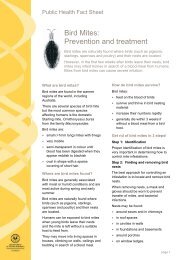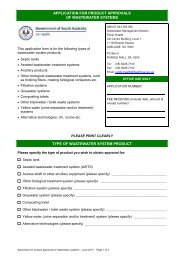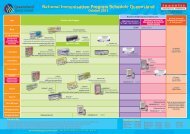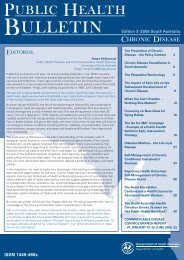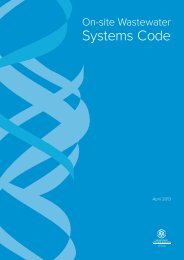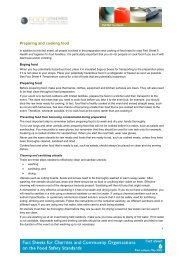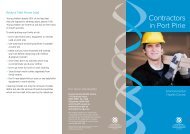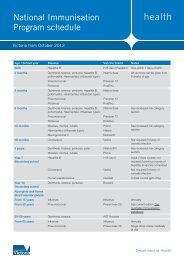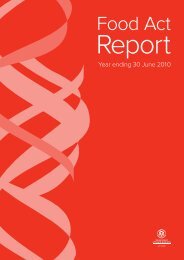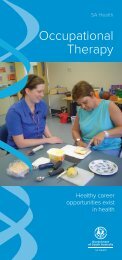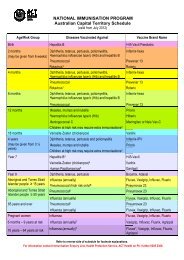Public Health and Communicable Diseases - SA Health - SA.Gov.au
Public Health and Communicable Diseases - SA Health - SA.Gov.au
Public Health and Communicable Diseases - SA Health - SA.Gov.au
You also want an ePaper? Increase the reach of your titles
YUMPU automatically turns print PDFs into web optimized ePapers that Google loves.
the Netherl<strong>and</strong>s (8.5%), 27 whose surveillance systemsrely primarily on notifications from health professionals<strong>and</strong> vaccine manufacturers.This commitment to parental reporting in SouthAustralia has fostered further research into attitudestoward vaccines <strong>and</strong> vaccine safety. From Case Study1, research conducted as part of the <strong>SA</strong> Vaccine SafetyData Linkage Project, we know that South Australianparents are highly supportive of vaccine safetymonitoring <strong>and</strong> generally believe vaccines are safe.This is supported by data from the Australian ChildhoodImmunisation Register, which places the proportionof “conscientious objectors” at around 2-3%. 28 Wealso know that parents are prepared to accept a newmethod of monitoring vaccine safety, called data linkage,provided their permission to participate is soughtbeforeh<strong>and</strong>.The parents interviewed in Case Study 2, followingtheir child experiencing an AEFI, were not deterredfrom continuing their child’s vaccinations, howeverthey did require more information about adversereactions afterwards. This study also provided the<strong>SA</strong> Immunisation Coordination Unit with valuablesuggestions for improving the management of AEFI <strong>and</strong>reinforced the need for access to comprehensive riskbenefitinformation prior to immunisation. Finally, CaseStudy 3 has shown that the uptake of new vaccinessuch as chickenpox, is not so much influenced byconcern about side effects but rather lack of knowledgeabout the vaccine, as well as cost.ConclusionVaccine safety is a major component of a qualityimmunisation program. <strong>SA</strong> is leading the way in vaccinesafety monitoring <strong>and</strong> research regarding communityattitudes. The case studies presented here should givepolicy makers <strong>and</strong> immunisation providers reassurancethat public confidence in vaccines is currently high in <strong>SA</strong>.What is unclear however, is whether this confidencewill be adequate to protect us from another “Wakefieldesque”vaccine safety crisis. To avoid this risk in thefuture, immunisation providers <strong>and</strong> policy-makerswill need to work very closely with parents <strong>and</strong>key stakeholders to maintain confidence, ensuretransparency <strong>and</strong> better underst<strong>and</strong> what affects publicconfidence in vaccines.A symposium coordinated by the University of AdelaidePreventive <strong>Health</strong>care Research Cluster “Linking scienceto a shot in the arm” held in April 2006 provided aninvaluable opportunity to begin aligning these researchactivities with policy priorities. There is considerablescope for research in this area <strong>and</strong> those interested informing collaborations are encouraged to contact DrMike Gold on 08 8161 7266 for further information.The cornerstone of the South Australian vaccine safetysurveillance system is the active promotion of reportingby parents. If you suspect an AEFI or would like adviceon managing or reporting an AEFI, please contact <strong>SA</strong>ICUon 08 8226 7177 9am-4.30pm Monday-Friday, or theChild <strong>and</strong> Youth <strong>Health</strong> Parent Helpline on 1300 364 10024hrs, 7 days a week.CASE STUDY 1Community <strong>and</strong> provider attitudes to vaccine safety<strong>and</strong> data linkage: Acceptability findings from the <strong>SA</strong>Vaccine Safety (<strong>SA</strong>VeS) Data Linkage ProjectData linkage (DL) is used to monitor vaccine safety inthe U<strong>SA</strong>, UK, Sc<strong>and</strong>inavia <strong>and</strong> Vietnam, <strong>and</strong> Australia’sfirst pilot project is presently being conducted in<strong>SA</strong>. Although DL can improve the quality of studiesevaluating vaccine safety, there is scant research onattitudes towards the method.To better underst<strong>and</strong> community <strong>and</strong> immunisationprovider feelings regarding data linkage <strong>and</strong> vaccinesafety, surveys were conducted in 2004 <strong>and</strong> repeatedin 2005. Community attitudes were collected via the <strong>SA</strong><strong>Health</strong> Omnibus survey (n=3000), <strong>and</strong> immunisationprovider attitudes via postal survey (n=830).Preliminary results indicate that most respondentsbelieved adult <strong>and</strong> childhood vaccines are very safe(58-87%), however providers were more likely to thinkthis (P



